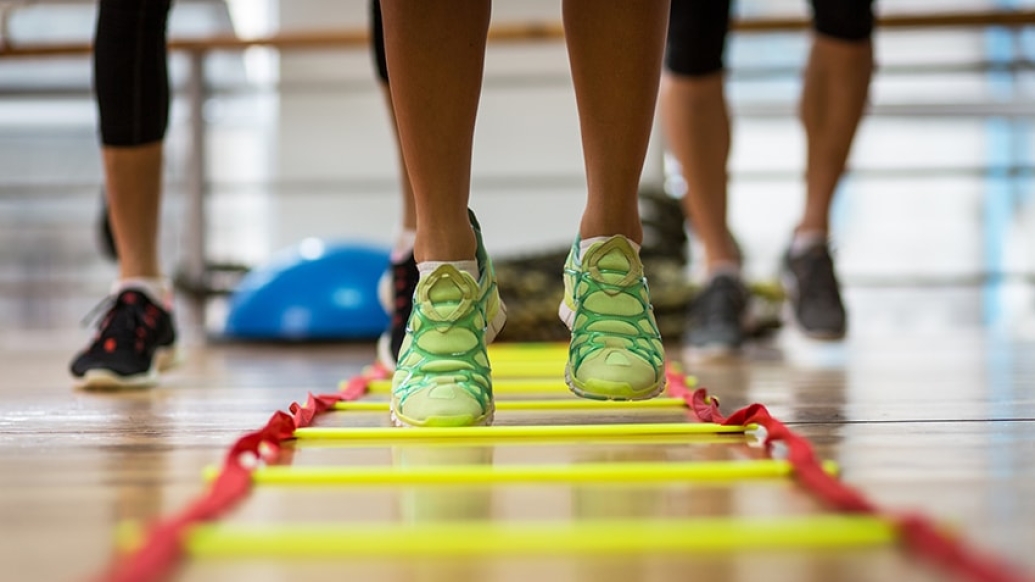Speaking from Pyeongchang, a Michigan Medicine physical therapist explains the benefit of trainers when starting (or boosting) athletic pursuits.
1:00 PM
Author |

On TV, Olympians make it look easy.
But their skill and grace come from years of practice. They also involve a key third party: trainers and coaches who help the seasoned competitors groom their minds and bodies — and, just as important, prevent injuries.
MORE FROM MICHIGAN: Sign up for our weekly newsletter
Such trainers aren't just for professionals, says Kristen Schuyten, P.T., D.P.T., M.S., C.S.C.S.
She's a Michigan Medicine physical therapy clinical specialist who is at the 2018 Winter Olympics in Pyeongchang, South Korea, working as part of the volunteer medical staff for U.S. Figure Skating.
Trainers, Schuyten notes, can help people of all stripes craft a game plan and pinpoint any risks that might derail it.
A person's goals and needs are likely to determine what type of trainer they select.
"Trainers or clinicians with a certification of strength and conditioning specialist (C.S.C.S.) through the National Strength and Conditioning Association are trained in the field of sports performance and are great resources for athletes," says Schuyten. "Many athletic trainers and physical therapists specializing in sports physical therapy are experts in this field as well."
Beyond credentials, a personal connection also matters.
"I have always noticed better results with working with my athletes and performers when the entire team is on the same page," says Schuyten, who answered questions from Pyeongchang.

Why might an athlete — novice or skilled — use a trainer?
Schuyten: Working with a strength and conditioning professional is integral to assist with optimizing performance in athletics, especially for those looking to perform at a high level.
Although typical coaching staff can assist with skill development of a sport and preparation for competition, these specialized professionals work to establish cardiovascular endurance, strength and power, flexibility and stability training as a foundation for sport performance.
What initial questions should people ask a trainer?
Schuyten: It is very important for the athlete to have an idea of what they want to accomplish with training. This can be broken down into long- and short-term goals.
SEE ALSO: 3 Ways Athletic Trainers Help Competitors Perform Their Best
Both are necessary to keep an athlete on track, with the short-term goals giving constant motivation that the athlete's hard work is paying off and that results are being made; long-term goals support the bigger picture of training and performance enhancement.
The athlete and trainer will also need to discuss the frequency of sessions and how this will align with their practice schedule and competition season. An independent home exercise routine is necessary to make progress outside of the training sessions and allow the body to adapt to further strength, flexibility and cardiovascular demands.
How should a trainee assess his or her body before getting started?
Schuyten: A few considerations are necessary to establish a training program. They include:
-
Physical activity and future goals. Are they a varsity athlete or trying out a new sport? Do they want to be a weekend warrior and run their first 5K or get a college scholarship? Did they take the summer off, or were they active in a summer league?
-
Focus of training. Does the athlete want to work on power, strength, jump height, flexibility, stability or balance — or all of the above?
-
Prior injury or surgery. Any trainer must proceed with caution when trying to figure out how an athlete's past injuries, current functional limitations or pain may inhibit their ability to perform in a training program.
-
Timing. When does their competitive season start, and how much time does the trainer have to help them accomplish their goals before this season?
-
Physical growth and development. Changes in an athlete's height affect more than their shoe or clothing size. Bones grow faster than the muscles and tendons can adapt during growth spurts; this may cause issues with flexibility, balance and coordination.
What physical and mental coaching can trainees expect?
Schuyten: Athletic activity includes cardiovascular and strength (including power and jumps) training, flexibility training and sport-specific training, along with many other subsets.
Equally important is mental training: Having the qualities of tough-mindedness, motivation and perseverance are all necessary. Advancement of these areas usually takes place during the offseason to advance without causing negative effects in sport performance.
How does a training program help avoid injury?
Schuyten: Your body adapts to the sport-specific demands you place on it, creating imbalances in strength, flexibility and stability. There are many examples in young athletes in which specialization and high volume has led to injury, including elbow surgeries in young baseball athletes, hip injuries in figure skaters and back injuries in soccer players.
SEE ALSO: Are You at Risk for Dead Butt Syndrome?
One of my favorite mantras is that "you must condition the body to perform your sport, not perform your sport to condition your body." This is not only important for training outside of your sport, but also exactly why keeping in shape throughout the offseason is necessary to get yourself off on the right foot for your competitive season.
This can be done by participating in other sports. In the off-ice training for figure skaters, we use Pilates, Gyrotonics, dance, yoga, swimming and body-weight training to assist with performance.
Can you tell if a trainee is overdoing it?
Schuyten: Overtraining syndrome affects athletes of all levels; I have seen it in endurance athletes and those with early sport specialization. Overtraining is a condition of chronic fatigue, underperformance and an increased vulnerability to infection.
If overtraining continues without proper management, it can lead to burnout. The athlete may lose interest in the sport, develop illnesses and have muscle or tissue breakdown. Without psychological intervention, the athlete may also start to display symptoms of depression, anxiety, disturbed sleep and other behavioral changes.
In addition, if training ramps up too quickly, the body may not be able to tolerate it and have further issue with tissue breakdown. Sprains, strains and stress fractures could occur.
What other healthful habits aid the training process?
Schuyten: Restful sleep is important for the body to repair itself. Not only is sleep necessary for growing bodies, but sleep restrictions can lead to cognitive impairment. The American Academy of Pediatrics recommends eight to 10 hours of sleep for adolescents, with athletes leaning toward the upper end of that range.
What you eat and drink is just as important. A healthy balance of carbohydrates, protein, fruits, vegetables, dairy and healthy fats not only fuels your body but assists with repairing muscle cells and overall recovery after hard workout sessions and competition.
Recovery includes taking care of your body, which can involve stretching, massage and appropriate warmup and cool-down techniques to assist with injury prevention, thus priming the muscles and cardiovascular system for activity and allowing for your heart rate and blood pressure to normalize after a difficult session.

Explore a variety of health care news & stories by visiting the Health Lab home page for more articles.

Department of Communication at Michigan Medicine
Want top health & research news weekly? Sign up for Health Lab’s newsletters today!





